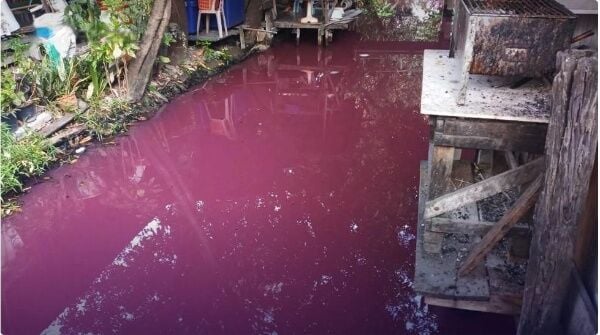Pollution turns Nonthaburi canal water pink

Reports revealed strange pink canal water in Nonthaburi on Valentine’s Day last week as scientists scrambled to uncover the truth behind the sudden rosy hue.
Experts from the Department of Science Service (DSS) embarked on an investigation uncovering startling findings that could change the way we see pollution. The case, discovered in Khlong Bang Phraek near the Big C department store on Tiwanon Street, sparked urgent calls for action.
Armed with the compound light microscope, the Mobile Rapid Response Scientific Team (DSS Team) delved into the heart of the issue. Their investigations revealed a culprit lurking beneath the surface: purple sulfur bacteria, thriving in the stagnant waters of the Khlong Bang Phraek canal.
Rungruang Kitpathi, the DSS Director-General explained that the anaerobic bacteria don’t need oxygen to wreak havoc; they feast on organic acids and hydrogen sulfide, turning the water into a sea of pink, reported The Nation.
In the wake of this alarming discovery, Rungruang issued a stern warning to the public, advising against using canal water for domestic purposes and urging caution when coming into contact with it.
“Immediate cleaning with water and soap is advised.”
Rungruang proposed solutions to combat the canal’s oxygen deficiency, suggesting the installation of air-based aeration systems or reducing organic pollution discharge.
“As we move forward, collaboration with relevant agencies is crucial to implement corrective measures.”
In related news, the escalating issue of PM2.5 pollution in Thailand led the government to encourage the public to utilise public transportation, particularly in the most polluted areas. Prime Minister Srettha Thavisin called for the public’s cooperation in the battle against the country’s increasing air pollution, which has seen a significant rise in recent days.
In other news, in a move to tackle the global scourge of air pollution, NASA launched a series of missions aimed at revolutionising the way we forecast and combat this deadly threat. With millions of lives hanging in the balance each year due to air pollution-related illnesses, the need for accurate identification and tracking of pollutants has never been more pressing.
Latest Thailand News
Follow The Thaiger on Google News:


























